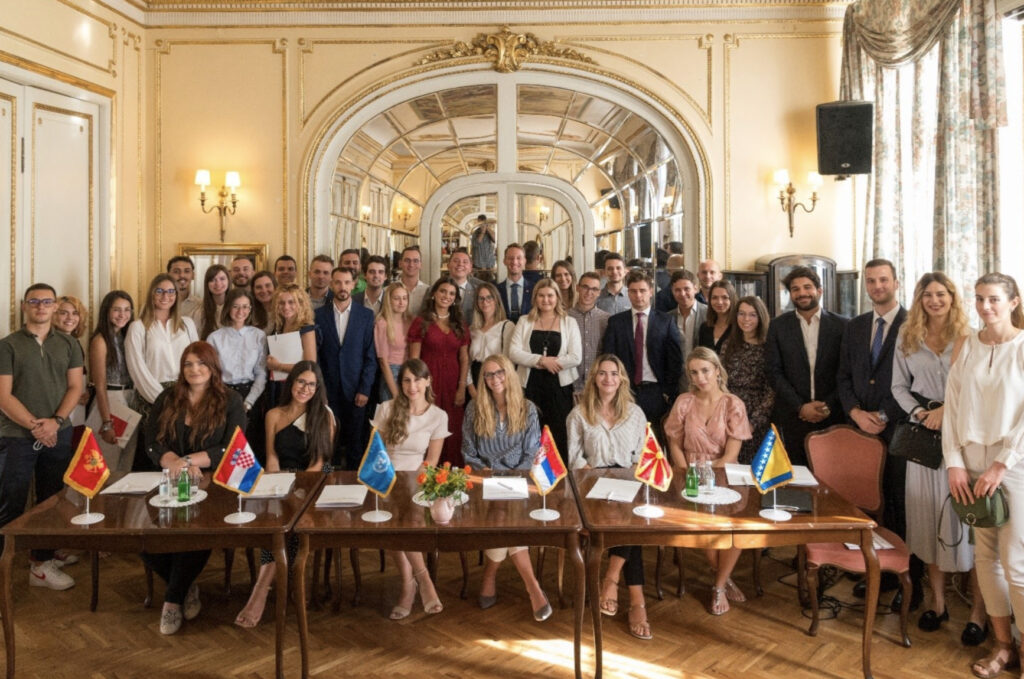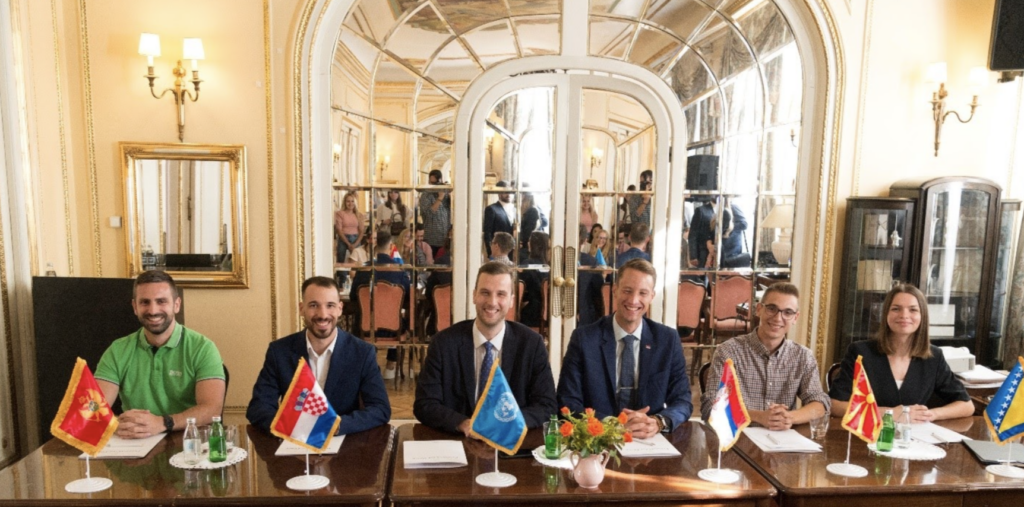Trinity Students Host Conference to Promote Regional Collaboration in Southeastern Europe through Davis Projects for Peace
In August of 2021, Belgrade, Serbia hosted its first youth conference to foster peace among southeastern European countries. This event was the brainchild of two recent Trinity graduates of the class of 2021, Ana Stambolic and Stanislav Knezevic. With Stambolic’s experience studying post conflict studies abroad at Oxford and her role as Finance Director of OSSA, and the organizational skills of Knezevic from studying abroad in Paris and London, they collaborated together to create the project proposal for the conference. Stambolic and Knezevic recognized the historical and ongoing tensions between Yugoslav countries, and were worried about the future of their home region. They looked at public polls and school history curricula, providing evidence of their claims of Ex-Yugoslavian States’ environment of mutual ethnic hatred and intolerance.
Stambolic and Knezevic see the youth as the future, and the youth as a malleable source for change, therefore putting youth at the center of this project. In their written report of the conference they shared, “For us, peace is a consequence of a relationship where no side is willing to act destructively towards that relationship because of the benefits that relationship produces. Hence, we wanted to promote the idea that there is great benefit to our cooperation and that such benefit should be guarded. Peace would come as a natural consequence of this mindset.” Focused on cooperation, they proposed a conference between the nations of Southeastern Europe consisting of dialogue, round table conversations for projects, networking, and presentations of current efforts for peace building in the region. At the conference they would bring together motivated youth leaders, and experienced diplomats, policy practitioners, and scholars to provide resources and advice to achieve successful cooperation. The two Trinity students applied for the Project for Peace grant, with the vision of encouraging and empowering youth in order to send a powerful, positive message to all of Southeastern Europe that cooperation is possible, desired and will bring peace.

The conference was funded by Davis Projects for Peace. Every year Davis Projects for Peace grants fund peace building projects created by students at Davis United World Colleges participating universities and colleges across the United States. Projects for Peace started from a vision of the late Kathryn W. Davis, and continued in inspiration of her. Learn more about Projects for Peace, Kathryn W. Davis, and other student projects at https://www.davisprojectsforpeace.org/. At Trinity College, students are involved in Davis Projects for Peace through the Center for Global and Urban Studies, which administers the process and supplies student grants.
The three-day conference kicked off on Thursday August 19 at the “Aeroclub” conference venue in Belgrade. All the representatives connected with each other for the first time in a formal setting, and listened together to the conference’s goals, other organizations’ projects, as well as youth panels. On the second day they reconvened at another Belgrade conference venue, “Hotel Majestic,” in order to brainstorm and discuss cooperative projects amongst the representative’s groups. A representative from the CIRSD also joined them to provide insight on diplomacy and sustainable development policy for peace and economic prosperity. The day culminated with drafting an agreement between the representatives.
The conference ended with the annual summer gala of OSSA. Already proving their future of cooperating, it was the first time ACSA and OMSA attended. The new President of OSSA and a representative from the Serbian Ministry of Foreign affairs gave speeches about the importance of participation in the initiatives for future cooperation. The conference accomplished all of its intended goals in its proposal, and gained wide coverage publicity through the oldest and most important Serbian newspaper, “Politika,” and the national media house, “Radio-Television Serbia.”

“From this experience, we both grew immensely. We realized that things are not set in stone and that we have the power to change our environment according to our needs. Given that the conference was the first time ever a Serbian, Croatian, and Montenegrin organization of its kind met in a formal setting, and this seemed impossible to many, we left this project with a feeling of great enthusiasm for the future.”
The conference plans to continue holding an annual conference, and the representatives plan to meet frequently online for the next few months. Their efforts are continuing and showing to work, as they have just signed their first Declaration of Future Regional Cooperation with OSSA, OMSA, and ASCA. They hope to hold another conference in Zagreb or Podrigica, and hope for more funding and grants for the conferences to continue. From a history of chauvinism and religious and ethnic intolerance in former Yugoslavian countries, this is a hopeful step for the future of the nations. These efforts by Stambolic and Knezevic strive for more tolerance amongst the nations in order for the countries to be sustainable and secure with the support from each other. The evidence is in the simple occurrence of the event, “The fact that these organizations declared an honest effort to cooperate and promote a peaceful agenda aimed at enhancing regional cooperation and peace signalizes that the new generation of young leaders has an authentic will to change things in the region for the better,” believe Stambolic and Knezevic.
